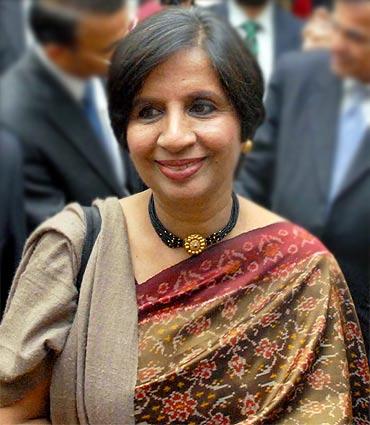

Rediff.com looks at the women who mean power in India today.
Nirupama Rao, Foreign Secretary
Even her worst critic will say India's foreign secretary is synonymous with diplomacy -- tough, not abrasive; calm, not frantic -- as and when required. And it may help that she is naturally soft-spoken, erudite and graceful.
It is natural progression for a woman who topped the prestigious civil services exam in 1973 and rose to become the only woman after Chokila Iyer to hold the post of foreign secretary.
When Nirupama Rao nee Menon took over from Shivshankar Menon, she came with an attache full of accomplishments -- India's first lady ambassador to China, first lady spokesperson for the ministry of external affairs among other achievements. She also served as minister of press affairs in Washington, DC; deputy chief of mission in Moscow; high commissioner to Sri Lanka; ambassador to Peru.
In an interview to The Tribune, she said that she loved words -- for the sound, the meaning, and the auras they create. Not surprising then she has a book of poetry, Rain Rising, to her credit.
Daughter of an army officer and married to IAS officer Sudhakar Rao who retired as Karnataka's chief secretary, Rao, who was to retire from the Indian Foreign Service this month, has been given a seven month extension and will remain the voice of India's diplomacy till next July. India certainly hopes to see more of her.
There is already talk that she will be India's next ambassador to the US. If the enthusiasm with which Barack Obama greeted her at Palam airport on November 7 is an indication, Indo-US ties could get a further boost with Nirupama Rao's presence in the Indian embassy at 2107 Massachusetts Avenue, Washington, DC.
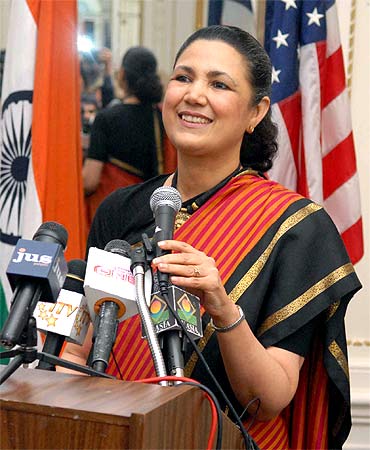
When Meera Shankar assumed office as India's ambassador to the US in April 2009, she became India's second lady ambassador to the US (Vijayalakshmi Pandit, Jawaharlal Nehru's sister, was the first) and the first serving Indian Foreign Service officer to be posted in Washington, DC in more than two decades.
She took office after serving as India's ambassador to Germany and is in her second tenure in Washington. Between 1991 and 1995 she was part of a dream team of women diplomats serving under then ambassador to the US, Siddhartha Shankar Ray, who passed away last month.
This elite group included Nirupama Rao, India's current foreign secretary. Shankar, like Rao, is also a 1973 batch IFS officer.
Shankar also served as director in the Prime Minister's Office from 1985 to 1991 -- Rajiv Gandhi was prime minister for most of this tenure, and Sonia Gandhi is said to be fond of her -- and in the ministry of commerce from 1991 to 1995.
Like Rao, Shankar is also married to an IAS officer of the 1973 batch -- her husband Ajay Shankar retired as secretary, Department of Industrial Policy and Promotion.
The elegant Shankar, dressed in exquiste saris, is a familiar figure on Capitol Hill and at think-tanks in Washington, DC, making an eloquent case why India is so important for America, and indeed the world.
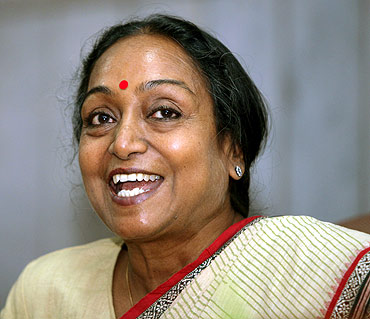
When you hear the Lok Sabha Speaker cajoling recalcitrant MPs to 'Please sit down' or beseech them with a 'Baith jaiye', you can scarcely imagine that the dignified lady with a little-girl voice is a five-time MP who has defeated political mammoths like Mayawati and Ram Vilas Paswan in a 25-year political career.
Meira Kumar made history on June 3, 2009, when she became the first lady Speaker of the Lok Sabha -- she was elected unopposed. But then she comes from venerable stock -- she is the daughter of the legendary Jagjivan Ram, who many observers believe was the most competent politician never to be prime minister.
Babuji, as Jagjivan Ram was called, was the most important Dalit politician after Dr B R Ambedkar's death and was a minister in Union Cabinets almost uninterrupted from Jawaharlal Nehru's time till 1979 when he believed then President Neelam Sanjeeva Reddy denied him a chance to lead the nation. Incidentally, Jagjivan Ram was defence minister when India defeated Pakistan in the 1971 war.
Meira Kumar joined the Indian Foreign Service in 1973 -- her batch mates were Nirupama Rao and Meera Shankar! All three ladies were at hand to greet President Barack Obama when he came visiting last month. She served at embassies in Spain and the United Kingdom among other postings, before resigning from the foreign service at Rajiv Gandhi's request to enter politics in the mid-1980s.
Nothing -- not seeing from her father in political action or her career as a diplomat -- could have prepared her to be Speaker in the Time of Turbulence. In the past year, despite rocky sessions and countless adjournments, she has shown that she is an acceptable successor to the venerable Somnath Chatterjee.
Despite her unruffled personality, she is no push-over. During the monsoon session, when Lalu Yadav briefly took over the Lok Sabha in her absence and conducted proceedings, she made her severe displeasure known, compelling her fellow Bihari politician to apologise.
Last month, in a bid to break the impasse that has paralysed the winter session, the Speaker hosted an all-party meeting, alas unsuccessfully. It was better attended than the meeting hosted by Finance Minister Pranab Mukherjee, the government's man for all reasons.
Not many MPs know that Meira Kumar rides well, and has won medals in shooting. If they did, perhaps they may be better behaved.
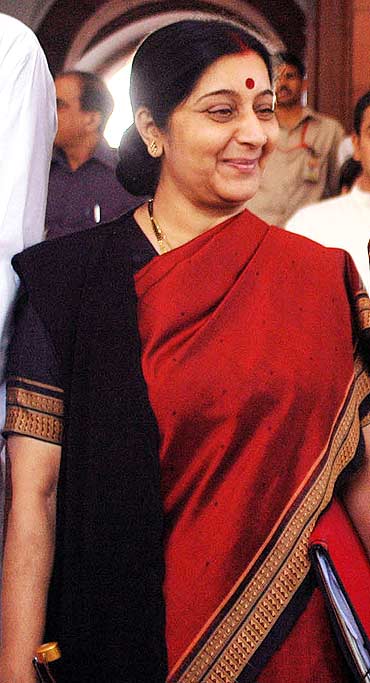
On November 30, Suhel Seth, the television talking head, tweeted: Is it true that Sushma Swaraj is on twitter? I thought twitter had some IQ barriers!!
Sushmaji did not respond. But some of the 3,115 people following her stood up for her, like actor Anupam Kher who asked: Who are we to decide people's IQ?
In an interview earlier to Rediff.com, Swaraj declared she was a thinking citizen. Though there were many contenders, the National Democratic Alliance chose the Bharatiya Janata Party MP from Bhopal to head the Opposition in the 15th Lok Sabha, among its 116 MPs, the successor to L K Advani.
Swaraj has never flinched from her role as Leader of the Opposition in the House of the People. A fine orator and a master in parliamentary tactics -- always vocal, sometimes grating in her political opinion, she has rarely allowed a Lok Sabha session to end without her comment, always in spectacular Hindi.
Her opinions, sometimes controversial, have always made space for change. In a heavily publicised and emotionally charged episode following the 2004 general election, she threatened to shave her head, don a white sari and eat groundnuts (symbolically mourning) if the Italy-born Sonia Gandhi became prime minister.
That tamasha did not happen thanks to Sonia's decision to step aside for our prime minister. Sushamaji has now admitted to a grudging respect and a cordial relationship with the Congress leader against whom she contested a Lok Sabha election in Bellary, Karnataka, in the 1999 general election.
It was that election that brought her in touch with G Janardhana Reddy and G Karunakara Reddy, now nationally known as the mining bros of Bellary. One Congress MP alleged this year that the Reddy brothers have invested heavily to make Swaraj -- who they reportedly revere and call Amma (mother) -- India's next prime minister.
If the Congress-led United Progressive Alliance comes apart at the next general election and the NDA gets a shot at power, the former Union Cabinet minister, former Delhi chief minister and the BJP's poster woman for an emerging India could well win the contest against Narendra Modi and Nitish Kumar, the likely front-runners for the job.
She appears to be already rehearsing for that role. During her encounter with Barack Obama last month, she firmly told the American president, 'There are loud whispers that India is a market and Pakistan is an ally. You are an outstanding communicator, such a good orator. Please wash away this impression.'
Swaraj is not a popular figure in BJP circles, so if she wants to be prime minister, she needs to first win friends in her party and the NDA, and also influence India's people, who could see her as a divisive figure with a slight record on development, the issue that carries the most weight when Indians come out to vote these days.
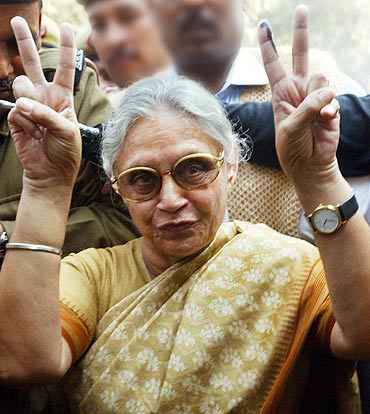
Ten days before the Commonwealth Games began, and much like an awful Bollywood comedy, a pedestrian bridge nearing completion collapsed. Delhi Chief Minister Sheila Dikshit, already roasted by the media and public, visited the site and then looking the television cameras in the eye, declared, 'These minor glitches and hitches do come around... but to make out as the whole thing is collapsing -- I am sorry, we do not agree with that. The accident is not as big as being made out to be.'
It was a rare mis-step for a politician who has played the media often as well as Ustad Zakir Hussein plays the tabla.
Just as the wolves in her Congress party bayed for her head, Dikshit assisted a Herculean effort -- led by Cabinet Secretary K M Chandrashekhar -- fixed the numerous glitches and ensured plenty of band-aid for India's battered reputation. Delhi cheered her as much as they booed Commonwealth Games organising committee chairman Suresh Kalmadi at the sporting event's opening and closing ceremonies.
It is this never-say-die attitude, image of a doer and unlikely charisma that has won her three terms as chief minister of the National Capital Region. Her many adversaries have made countless efforts to oust Dikshit, but the lady has stayed in charge.
Dikshit introduced the initiative of Bhagidari -- people's participation in the process of governance -- and has been credited with starting the Delhi Metro, CNG-fuelled public transport system, built impressive flyovers that makes Mumbaikars jealous, and an increase in the NCR's green cover (from 26 sq km in 1998 to over 300 sq km in 2008.)
Many residents believe Dikshit must take the rap for Delhi's deteriorating law and order -- though she will quickly point out she has no control over that portfolio; the capital's security is the Union home ministry's brief.
It is uncertain if she will win a fouth term in office -- we don't know yet if the 72-year-old wants to contest another election -- especially after the allegations leveled against her during the run-up to the Commonwealth Games, but Sheila Dikshit may well be seen in the same prism as Lutyens, builder of the new Delhi.
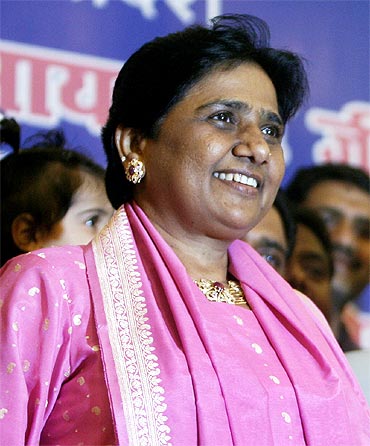
In the Limca Book of Records is an entry listing the 'largest political rally in India' -- a gathering of over 576,000 people organised by the Bahujan Samaj Party for Chief Minister Mayawati in Lucknow.
Her astonishing political career -- she has been chief minister of India's most populous and politically most important state four times! -- is vindication of her decision to leave home and team up with a then political nobody -- BSP founder Kanshi Ram -- defying her conservative father who chose to educate his six sons over her.
Her father may never have believed that his firebrand daughter, once a school teacher, would one day become UP's youngest chief minister -- she was then just 39 -- and the first Dalit woman chief minister of any Indian state.
Neither could he have imagined that she would have an estimated personal net worth of more than Rs 87 crore (Rs 870 million) in 2010, a gain of at least Rs 35 crore (Rs 350 million) over her 2007 declaration -- a 67 per cent return in three years!
Her wealth and the apparent use of the state's coffers for her political whims -- allegedly over Rs 1,000 crore (Rs 10 billion) spent to erect her statues (the cost of Kanshi Ram's, Dr B R Ambedkar's and elephants (the BSP's symbol) statues have yet to be ascertained) -- have startled India by its brazen disregard for public opinion.
Behenji -- as BSP cadres hail her -- even approved a plan to recruit a special police force to protect the statues from vandals.
Early this year, at the party's silver jubilee celebrations, which reportedly cost an astounding Rs 200 crore (Rs 2 billion), Mayawati was given a garland of Rs 1,000 notes which according to some estimates was worth Rs 22.5 crore (Rs 225 million).
In February she will tour UP, check out the process of development (Nitish Kumar's triumph next door has apparently rattled her) so that that issue does not scuttle a fifth term as Mukhya Mantri.
After the reverses in the last general election, she hasn't referred to her ambition of becoming India's first Dalit prime minister. If she wins the 2012 assembly election, you can bet your last rupee that Mayawati and the BSP will be back in the reckoning for the 2014 general election.
But for that Mayawati needs to veer away from her exclusive caste-based electoral agenda and devise a strategy based on delivering tangible progress and security to Uttar Pradesh's 170 million-odd people.
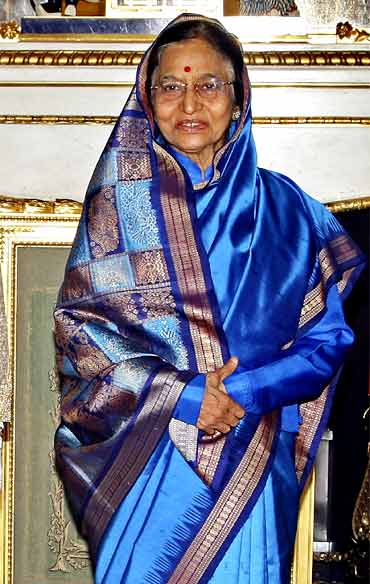
Pratibha Patil can possibly identify with Lyndon Baines Johnson. Like LBJ who took charge as America's president after the charismatic John F Kennedy, Patil succeeded A P J Abdul Kalam, arguably India's most loved President.
On July 27, 2007, when she assumed office as India's first lady president, not many gave her a chance to do well.
But she has done well. Well versed in navigating her way through the byzantine maze of Indian politics, the veteran -- remember she contested her first election in Maharashtra when she was just 27 -- leader has ensured that her office has stayed away from the minefields inevitably laid by the course of coalition politics, and conducted her presidency with remarkable dignity.
If Patil leaves behind a legacy, it is this. She brought to the presidency a certain warmth, without taking away from its majesty.
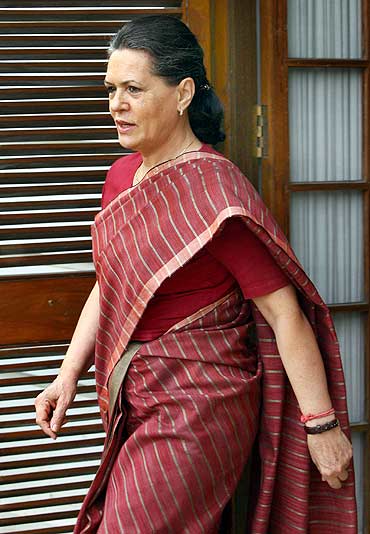
Sonia Gandhi wears three crowns with commendable ease. President of the Congress party; Chairperson of the ruling United Progressive Alliance; leader of the Congress Parliamentary Party.
She is the longest serving president of the Congress party -- 12 consecutive years! Not even her great grandfather-in-law, grandfather-in-law, mother-in-law or husband* can match that record.
Sonia was named the third most powerful woman in the world by Forbes magazine in 2004 and among Time magazine's people of the year in 2007 and 2008.
She is and will likely remain, the most powerful and most influential person in the country.
But multiple challenges beckon. The controversies and scandals of recent weeks have cast a lengthening shadow over her political management skills. Sonia appears unsure how to arrest the growing popular anger and disenchantment with the Congress and UPA.
As Arun Shourie told my colleague Sheela Bhatt on Rediff.com last week, few Congress leaders fear Sonia Gandhi anymore, which is why the Congress seems clueless in a state like Andhra Pradesh which is politically so important for the party's return to power in 2014.
The attacks are bound to increase in the weeks and months to come. As Opposition parties smell the blood of a wounded Congress party, they are bound to rush in for the kill. Within her own party and the ruling alliance, Sonia must demonstrate ruthless leadership, the kind her mother-in-law often displayed when her reign came under fire from belligerent adversaries.
Sonia does not appear to have those instincts in her. Perhaps then, for the Congress party's stake, she may want to step aside for her son Rahul, who, beneath that veneer of finesse, could have very sharp teeth indeed.
*Motilal Nehru, Jawaharlal Nehru, Indira Gandhi and Rajiv Gandhi respectively.